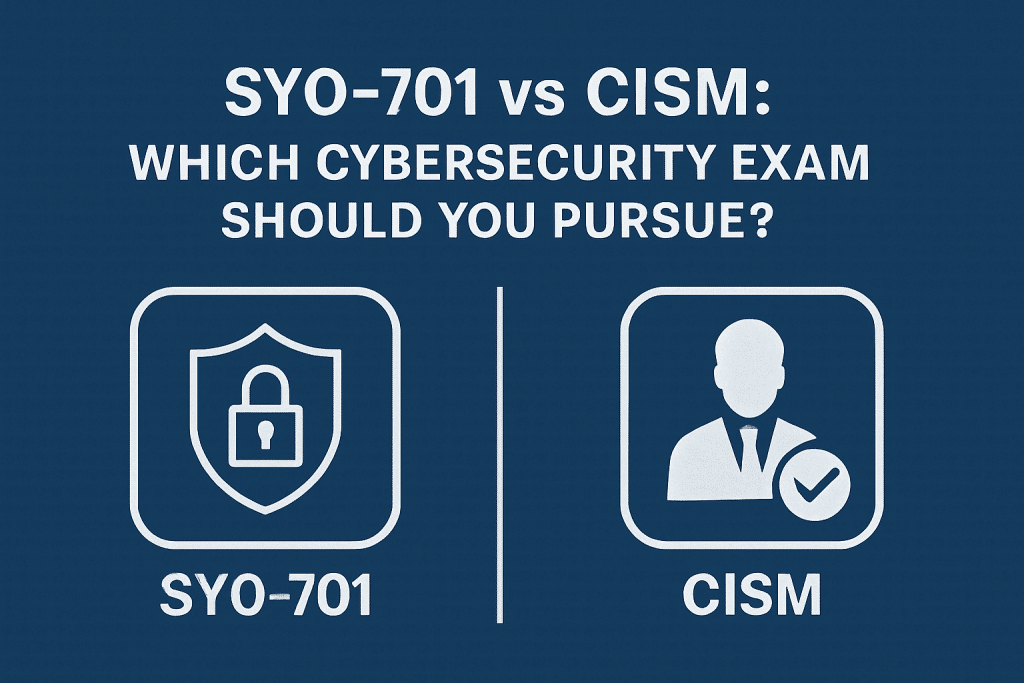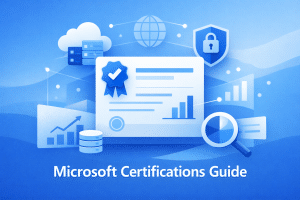CompTIA’s SY0-701 and ISACA’s CISM are both valuable security certifications , and you’re wondering: which one actually makes sense for where I am right now?
People tend to throw around “CISM is for managers” and “Security+ is for beginners,” but that’s just surface-level stuff. If you’re trying to decide between the two, you don’t need vague labels, you need to understand what each exam really asks of you, how deep it goes, and what happens once you pass.
SY0-701 vs CISM: Which Certification Should You Choose?
| Criteria | SY0-701 (Security+) | CISM |
| Full Name | CompTIA Security+ (Exam SY0-701) | Certified Information Security Manager |
| Issued By | CompTIA | ISACA |
| Focus Area | Foundational cybersecurity skills and best practices | Information security management and governance |
| Target Audience | Entry-level to early-career security professionals | Experienced IT managers and security leaders |
| Experience Requirement | Recommended: 0–2 years in IT/cybersecurity | 5 years in information security (waivers available) |
| Exam Duration | 90 minutes | 4 hours |
| Number of Questions | Maximum 90 (multiple choice & performance-based) | 150 (multiple choice) |
| Difficulty Level | Beginner to Intermediate | Advanced/Managerial |
| Certification Validity | 3 years (renewable with CEUs) | 3 years (renewable with CPEs) |
| Best For | Security analysts, IT support, SOC team members, security architecture | Security managers, IT directors, CISOs, security administrator |
| Average Salary | ~$70,000–$90,000 annually (US average) | $120,000+ annually (US average) |
If you’re exploring Security+ more seriously, check out this SY0-701 exam guide. It breaks down the exam’s structure, key domains, and proven tips for first-time success. Before you dive deeper, try a free Security+ practice question to check your understanding of exam concepts in real time.
If we’re talking about difficulty, yes, SY0-701 is the lighter lift
There’s no pretending here. SY0-701 is a beginner-level cert.
It was built to test whether you understand core security functions, security operations at a technical level, network threats, incident response, risk mitigation, and the kind of day-to-day stuff you’d handle in a SOC role or junior analyst position. Most of the questions are based on scenarios, but they’re grounded in common sense and practical application.
The exam itself isn’t trying to trick you. If you’ve taken some decent courses, gone through study guides, and maybe focused on exam preparation by practicing using dumps (like those from Cert Empire that people rely on when time’s tight), you’ve got a good shot at passing. There’s no hard experience requirement, no complex structure, just pure knowledge and applied understanding.
CISM, though? That’s a different game entirely
Here’s where people trip. CISM is absolutely not designed for beginners. It’s geared toward people who’ve been working in the cybersecurity space for years and are moving into leadership roles like security managers, compliance leads, or even CISOs. The questions aren’t about how to configure a firewall; they’re about how you’d handle governance, align business and security objectives, or respond to incidents without crashing compliance processes.
Even if you study hard, if you don’t get how security is managed across teams, departments, and entire enterprises, it shows. That’s why ISACA requires five years of work experience in information security before they’ll officially award the cert. To make your preparation more targeted, CISM exam dumps from Cert Empire cover strategic-level concepts and management scenarios that closely match what ISACA tests for. You can take the exam without it, sure, but it won’t mean much until that experience box is checked. You can also test your readiness with a free CISM practice question to see how well you handle management-focused scenarios.
So is one “smarter” than the other? Depends what kind of smart we’re talking about
If you’re looking at this from a skill-building lens, SY0-701 is smart if you’re early in your career and looking for a globally recognized certification . It gives you a rock-solid foundation, especially if your plan is to land a job fast and grow from there. It’s also more affordable, more accessible, and frankly, more aligned with what entry-level and mid-tier roles expect right now.
On the flip side, if you’re already working in the field, leading teams, and focusing more on compliance frameworks, organizational security policies, and implementing security solutions than day-to-day tech, then CISM is probably the smarter option for you. It’s harder but it’s harder because it’s meant for a totally different role.
Let’s keep it real for a second
You can’t pick a cert just because it “looks better.”
If you go after CISM without the management mindset, and understanding of security controls you’ll struggle and hiring managers will spot that disconnect right away. Likewise, if you’re 6 years into your career and still sitting on just a SY0-701, you’re probably holding yourself back from bigger roles and general security concepts.
Each of these exams is “smart” in its own way. The real question is: what kind of smart do you need to be right now for thesr information security certifications?
What SY0-701 and CISM Are Really Testing You On
A lot of blogs try to cram both exams into the same box but that never helps anyone actually trying to pick the right path. These aren’t two versions of the same test. They’re completely different in terms of purpose, structure, tone, and even mindset.
So, instead of comparing them side by side right away, let’s talk through each one separately, from the ground up for the cybersecurity workforce.
SY0-701: Built for Security Foundations That Actually Matter
CompTIA’s SY0-701 is the current version of the Security certification exam, and it’s probably one of the most widely attempted and the most popular cybersecurity certification out there because it hits that sweet spot between entry-level knowledge and real-world usability. It’s not a beginner cert in the sense of “easy,” but it is designed for people early in their cybersecurity journey.
Here are five of the eight domains:
- Threats, Attacks, and Vulnerabilities
You’ll need to understand common threat types, malware, phishing, DDoS, insider threats, access management, and how they show up in real environments. Expect to be tested on how attacks happen and what tools or steps you’d take to identify or stop them. - Architecture and Design
This section looks at secure system design, how cloud, on-prem, and hybrid environments should be set up with security in mind. Basic encryption knowledge, secure coding concepts, and zero trust principles all fall in here. - Implementation
You’ll get into the weeds of configuring things, setting up firewalls, managing access control lists, deploying secure protocols. It’s practical. Stuff you’d do in a job. - Operations and Incident Response
Expect questions about handling incidents: detection, escalation, containment, recovery. They want to know you understand security processes, not just security terms. - Governance, Risk, and Compliance
Not as deep as CISM’s coverage here, but still important. You’ll see policy questions, basic risk frameworks, and legal concepts like GDPR, HIPAA, etc.
It’s a performance-based exam too, which means you won’t just be memorizing definitions. You’ll get dragged into simulations where you have to apply knowledge in practical ways, picking the right tools, interpreting logs, configuring settings, and so on.
Who it’s for:
Anyone looking to get started in security, help desk pros wanting to move into SOC roles, IT folks transitioning into cybersecurity, or even total newcomers with a tech background. If you want to do security, not just talk about it, SY0-701 gives you that first step.
If you’re aiming to fast-track your preparation with proven strategies and study resources, check out this ultimate SY0-701 exam preparation guide for a step-by-step approach.
CISM: Security from a Leadership Point of View
Now let’s shift to the other side of the field.
CISM, which stands for Certified Information Security Manager, is owned by ISACA and speaks a completely different language. This isn’t about knowing how to configure a server or read logs; it’s about understanding the context of cybersecurity threats . It’s about how you manage a security program at scale, how decisions are made, how policies are written, and how risks are handled at a business level.
There are four main domains the exam covers:
Information Security Governance
This is all about aligning security with business goals. You’ll need to understand governance frameworks, organizational structures, and how policies support long-term objectives. There’s strategy here, not operations.
Information Risk Management
Unlike SY0-701, which touches on risk lightly, CISM wants you to deeply understand risk assessment methodologies, business impact analysis, treatment plans, and ongoing monitoring. You need to think like a business leader who’s keeping the company out of legal and reputational trouble.
Information Security Program Development and Management
In other words, can you build and run a security department? That’s the core of this domain. It covers staffing, budgeting, defining metrics, creating roadmaps, and working with other departments.
Incident Management
Not how to contain a malware attack yourself but how to ensure your teams have the right playbooks, communication plans, and response systems in place. This domain focuses heavily on coordination, not console work.
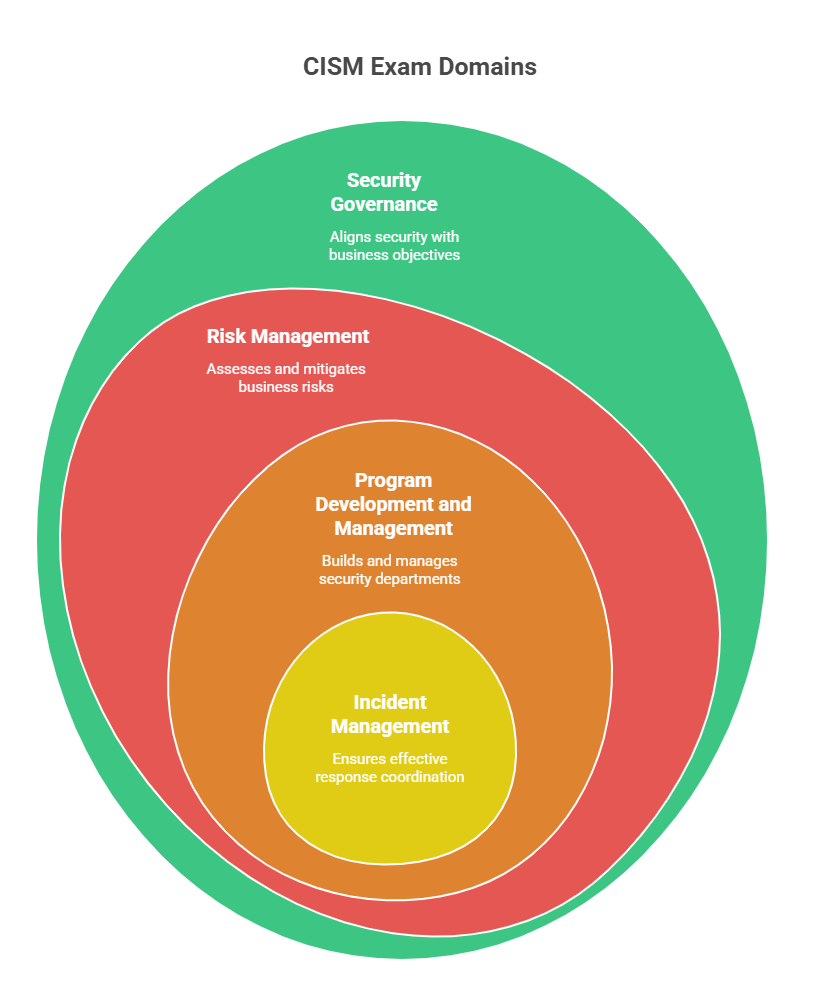
The exam is heavy on real-world judgment and business alignment, assessing how you would choose appropriate security solutions . It’s built for people who are either in, or aiming to be in, management-level roles. The questions aren’t multiple-choice guesswork either, they’re tricky, wordy, and often built around “best possible response” scenarios. You’ll need experience just to understand the context of some questions.
Who it’s for:
People who’ve been in the field a while, security analysts, engineers, architects—who are stepping into more strategic or leadership positions. Also valuable for consultants, risk managers, and even GRC-focused professionals. It assumes you’ve already got a technical base, possibly through advanced certifications, and now want to focus on big-picture thinking.
CISM vs SY0-701 Career Growth: What’s at Stake?
One of the biggest mistakes people make when chasing cyber security certs is thinking they all lead to the same outcome. That you can grab any badge and it’ll automatically open the same doors. Not true—especially with SY0-701 and CISM. These two certs are built for different stages, different goals, and even different industries, in some cases.
So before signing up for either exam, it’s worth asking: What kind of career are you trying to build here? Because the choice you make might lock you into a track that’s hard to pivot from later.
Where SY0-701 Takes You in the First 2–3 Years
If you’re new to security, or shifting from general IT, SY0-701 is a solid foundation. And unlike a lot of beginner-level certs, this one actually does something on your resume. It gets past automated filters. It shows up in job listings. And hiring managers recognize it.
Here are some roles that typically list SY0-701 (or Security+) as a requirement, which expect baseline skills in security.
- SOC Analyst (Tier 1 or 2)
- Security Operations Technician
- IT Security Support
- Cybersecurity Analyst
- Network Security Specialist (junior level)
- Entry-level GRC roles (in larger orgs)
Curious about where entry-level certs like SY0-701 can eventually lead? Here’s a list of top-paying networking jobs that show how foundational skills grow into six-figure careers.
It gets your foot in the door. And in a lot of orgs, that’s all you need to start climbing. Once you’re in and proving yourself, you’ll move faster, into incident response, threat hunting, or cloud security tracks depending on what interests you.
But here’s the catch: SY0-701 alone won’t push you into management or strategy roles come exam day . It’s not supposed to. It’s tactical. It’s for doers, not directors. So at some point, if you want to grow out of that technician space, you’ll need to layer on more advanced certs like CySA+, CISSP, or yes, even CISM.
CISM Starts Where SY0-701 Taps Out
Now flip the page. If you’re already past that early stage, maybe you’ve worked as a security engineer, done your time in the SOC, or led small teams CISM starts to make a lot more sense.
The roles that value CISM tend to have titles like:
- Security Manager
- IT Risk Manager
- Director of Cybersecurity
- Information Security Consultant
- Compliance and Governance Lead
- CISO (in smaller orgs or early-stage firms)
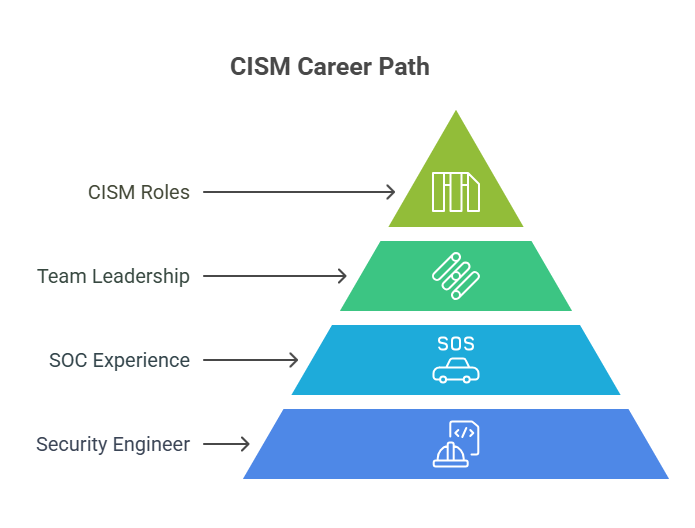
These roles are less about configuring things and more about aligning security practices with the organization’s business goals. You’re managing people, writing budgets, building long-term security programs, or working directly with auditors and legal teams.
And here’s the thing, CISM is a title booster. It has weight. When someone sees it on your resume, they assume you’re not just technical, you understand the bigger picture. It shows you’ve moved beyond tools and into decision-making territory.
For another perspective on career progression, our SY0-701 vs CISSP comparison highlights how Security+ stacks up against one of the industry’s most advanced certifications.
What About Growth Speed?
Let’s talk timelines.
SY0-701 is faster to acquire. You could study for a few weeks, practice some dumps, and pass. That speed makes it great for job changers or people trying to upgrade their resume before applying. But long-term? Its growth potential plateaus unless you stack more certs or move into specialized areas like threat intel or forensics.
CISM takes longer to earn and requires proof of real-world experience but the payoff is bigger. It sets you up for higher salary tiers, leadership tracks, and positions where you’re not just another replaceable security tech. You’re the one making security decisions, not just following them.
Pick the Wrong One, and You Might Stall Out
Here’s the brutal truth most blogs won’t tell you:
If you grab SY0-701 and stay there for too long, you risk being stuck in support roles.
If you grab CISM too early, without any practical experience, you’ll bomb interviews and get passed over for people who actually know how to do the work.
Career growth isn’t about which cert is “better.” It’s about which one matches your current position and pushes you one level higher.
SY0-701 vs CISM Salary: Who Ends Up Earning More?
Most people don’t chase certs just for fun. There’s usually a paycheck at the end of the goal, or at least a better one than they’re currently getting. And while both SY0-701 and CISM can help you move up, they don’t exactly land you in the same salary bracket. That’s mostly because they’re tied to different roles, with different levels of responsibility and risk.
So how much can you actually expect to earn with either cert, and is one clearly better than the other when it comes to your wallet?
SY0-701: A Solid Start, But You’ll Need to Keep Climbing
Let’s start with SY0-701.
Most people who earn this cert are aiming for their first or second job in cybersecurity. That means the salary tends to land somewhere in the $60k to $85k range in the U.S., depending on location, company size, and your other skills (like cloud, scripting, or endpoint management).
Here’s what that looks like in actual job postings:
- SOC Analyst (Tier 1): $62,000 – $75,000
- Security Technician: $65,000 – $80,000
- Junior Cybersecurity Analyst: $70,000 – $85,000
These are the kinds of jobs where SY0-701 isn’t just accepted, it’s expected. The cert basically proves you’re ready to get involved in hands-on work. It’s often listed as a “preferred” requirement on listings, especially for federal jobs and DoD roles under 8570/8140 compliance.
But here’s the deal: if SY0-701 is your highest cert, you’ll hit a salary ceiling fast.
Employers see it as a signal that you’ve got potential but not necessarily depth. You’ll eventually need something else (CySA+, CASP, CISSP, etc.) to push into higher-paying roles.
CISM: Bigger Cert, Bigger Paycheck
Now switch gears.
CISM isn’t entry-level. So the people who hold it are usually walking into higher-scope positions within the cybersecurity field —roles that demand judgment, planning, leadership, and risk ownership. These jobs pay more because you’re on the hook for more.
Average salary numbers in the U.S. for CISM holders? Usually $120k to $160k, with the upper tier going past $200k in government or large enterprise environments.
Here’s what that looks like in practice:
- Security Program Manager: $125,000 – $150,000
- Information Risk Consultant: $135,000 – $165,000
- Security Director / GRC Lead: $140,000 – $175,000
- CISO (Mid-Sized Org): $160,000 – $210,000
If you compare that to where SY0-701 maxes out, it’s a clear leap. But again, it’s not automatic. Just getting CISM doesn’t guarantee a six-figure paycheck. You need to back it up with actual management experience, a strong background in policies and controls, and ideally, past project work around compliance or risk frameworks like NIST, ISO 27001, or COBIT.
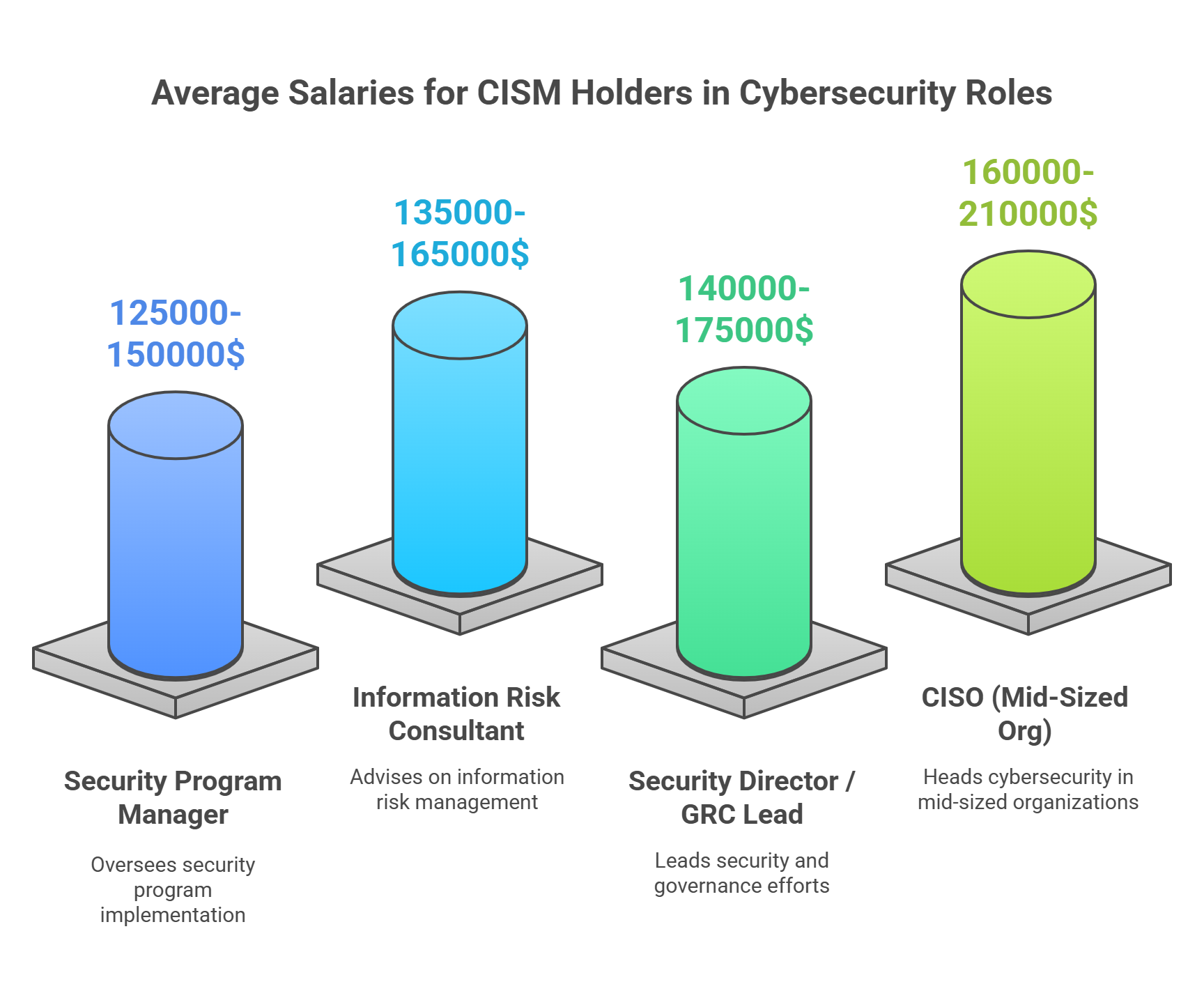
Which Pays Off Faster? Depends Where You Are Right Now
Let’s say you’re starting fresh, zero security experience, no prior IT background. In that case, SY0-701 is more useful because it gets you earning something quicker. You can pass the exam, land an analyst role, and start building experience that eventually leads to better-paying positions.
But if you’re already 5–7 years deep into cybersecurity and looking to break into management or move out of engineering work? Then CISM is a smarter money move. It’s the kind of cert that unlocks salary negotiations during promotions or job switches, especially if you’re applying to larger orgs with formal risk departments.
Don’t Just Look at the Numbers, Look at the Long-Term Value of Multiple Certifications
One last thing. Salary isn’t just about the number on your offer letter, it’s about where that number can go.
- SY0-701 gets you in. It’s a launchpad. It builds confidence, shows technical chops, and gives you your first raise.
- CISM moves you up. It shows leadership readiness. It opens doors into meetings and planning sessions instead of just the SOC dashboard.
So if you’re playing the long game, don’t just chase the cert that starts higher. Chase the one that matches where you want to be in 3–5 years.
You Want to Work in Cybersecurity. Which One Gets You There Faster?
Sometimes, it’s not just about which cert is “better.” It’s about which one gets you working. Like, actually landing interviews, starting the job, and getting paid. Because whether you’re shifting careers or just breaking into tech, speed matters.
And in this case, SY0-701 and CISM are miles apart in how fast they move you from studying to employed. You need to know security posture, systems administrator, vulnerability management, contrast concepts, other factors on covering topics regarding information technology and cybersecurity career.
SY0-701 Can Get You in the Game in a Few Weeks
Let’s keep it simple: SY0-701 is the faster route, period.
You can prep for it in as little as 4 to 8 weeks, depending on how much time you can study. The content is manageable, the study material is everywhere (books, video courses, bootcamps), and the exam doesn’t require any work experience to attempt.
Some people even prep in under a month, especially those using reliable PDF dumps from trusted sites like Cert Empire, a trusted source for up-to-date certification material and real-exam-based content across the IT landscape. If you’ve already got a basic IT background or you’re working in support or networking, the learning curve isn’t too bad.
Even better? A lot of entry-level roles list SY0-701 as “preferred” or “required”, so just having it on your resume can bump you ahead of other candidates.
CISM Takes Longer and Not Just Because of the Exam
Now, CISM? That’s a longer process.
First of all, you can’t officially earn the cert until you prove 5 years of security work experience and that experience has to be spread across at least three of ISACA’s defined domains. You can take the exam without the experience, but they won’t actually award you the cert until that box is checked.
That alone slows things down.
And even if you do have the experience, the exam prep takes longer than SY0-701. We’re talking 2–3 months minimum, sometimes longer, depending on how comfortable you are with governance, risk frameworks, and organizational strategy. There’s less of the “let me lab this out” learning and more “read, process, and apply” thinking.
Also, most jobs that value CISM expect you to already be in the field. This isn’t a cert that magically gets you a job if you’ve never worked in security before. It’s a career elevator, not a door opener for security program management.
If You’re in a Hurry, the Choice Is Obvious
Let’s say you’re unemployed right now, or stuck in a non-security role and trying to make the leap ASAP. Going after CISM would be… a stall. You’d burn time and money trying to pass a cert that no one will take seriously until your resume shows real-world experience.
SY0-701, on the other hand, lets you:
- Get certified quickly
- Start applying to actual jobs within weeks
- Build experience that counts towards CISM later
That’s why so many people use SY0-701 as their on-ramp into cybersecurity. It doesn’t promise the world, but it does open the first gate. From there, once you’ve got some years under your belt, CISM starts to make sense.
But Here’s Where It Gets Interesting
Some folks make the mistake of thinking CISM is only for veterans. Not entirely true.
If you’re coming from a non-security leadership background—like IT management, auditing, or project management, and you’re trying to move sideways into cybersecurity, CISM can actually help. Even if you haven’t done firewall configs or pen testing, you might already have transferable experience that fits CISM’s domains.
But again, it’s not fast. You’ll still need to prove your background, build out your knowledge, and possibly wait months before the cert actually pays off.
Speed Isn’t Everything, But It Does Matter
Bottom line?
SY0-701 gets you in fast.
It builds a security base, gets you job-ready quickly, and sets up your longer-term cert path.
CISM gets you promoted later.
It’s slow, serious, and tied to experience, but it moves your career to a strategic level when the time’s right.
So if time is your main concern, and you need movement now? SY0-701 is the better play.
SY0-701 vs CISM for Beginners: One’s Friendlier Than the Other
If you’re just starting out in cybersecurity, these two certs don’t exactly feel equal. One of them almost feels like it welcomes you in. The other? Kind of like trying to walk into an executive meeting without an invite.
SY0-701 is Basically Made for Beginners
It might not say “beginner” on the label, but everything about SY0-701 says it out loud.
The language is clearer. The exam objectives are structured around actual job tasks that a junior analyst would perform. The training material is everywhere, from YouTube playlists to paid bootcamps. And most importantly? You don’t need any prior experience to get started.
Even if you’ve never worked in a cybersecurity job before, you can pick up a SY0-701 book, study for 4–6 weeks, and walk into the exam center with a decent shot at passing. Add a few mock tests and good dumps from places like Cert Empire, and you’re even better prepared. For focused prep, try SY0-701 exam dumps that cover real-world scenarios and practical simulations, exactly like what you’ll face on test day.
And once it’s on your resume? You’re in the game. Recruiters recognize it. It shows that you’re serious about getting into the field. You might still need to hustle for that first job, but SY0-701 definitely helps crack the door open.
So yeah, if you’re a beginner, this cert’s built for you.
If you’re still deciding where to start, here’s a quick look at the easiest cybersecurity certifications for beginners. It’ll help you gauge where SY0-701 stands among other starter options.
CISM? Not So Much. It Speaks a Whole Different Language
Now, let’s talk about CISM, and why it’s not beginner-friendly, no matter how tempting it looks on LinkedIn profiles.
Right off the bat, the exam isn’t testing whether you can do security tasks. It’s testing whether you can oversee, manage, and guide security programs. That’s not something you can Google your way into. It assumes you’ve been in meetings, led teams, written policies, and made risk decisions.
The terminology in CISM exam questions feels different, too. It leans on business logic, not tech skills. Questions might ask you to choose the most cost-effective control, or to align a security initiative with organizational goals. That’s not beginner stuff.
Even if you could memorize enough to pass the test (and some do), you’ll still hit a wall afterward because without real experience, you won’t be able to back it up in interviews. And remember: ISACA won’t even grant the cert unless you’ve logged 5 years of experience in info sec roles that touch at least 3 of their defined domains.
Can Beginners Skip SY0-701 and Go Straight for CISM?
Technically? Yes. But should they? Almost always no.
Unless you already have some kind of management or compliance background in a different industry that overlaps with cybersecurity, jumping straight to CISM is going to feel like skipping middle school and showing up for a university-level board exam.
You’ll spend a lot more time trying to understand the content, and you’ll probably come out the other side with a cert that doesn’t help you get hired—because hiring managers will spot that mismatch a mile away.
A Smart Move for Beginners? Start Small, Build Up
There’s nothing wrong with starting with SY0-701, getting 1–2 years of experience, and then aiming for CISM once you’ve got the background. That path is faster than trying to brute-force your way into CISM too early and getting discouraged or stuck.
Plus, building your way up gives you something even more valuable than the certs themselves: context. That’s what makes you actually good at the job and what makes certs like CISM make sense when you finally get there.
The Work You’ll Do After You Pass: Comparing Job Responsibilities
Getting certified is one thing—but what about the work? What do these certs actually lead to in terms of real-life responsibilities? That’s where the real difference shows up.
And it’s not just about job titles. It’s about how your day looks when you show up for work what tools you’re touching, what decisions you’re making, and who’s waiting on your input.
SY0-701: Expect Tickets, Tools, and Tactical Work
Let’s say you pass SY0-701 and land that first security analyst job. What happens next?
You’ll be logging into a SOC dashboard, pulling reports, flagging unusual traffic, helping with phishing investigations, updating firewall rules, digging into SIEM alerts, and doing a lot of documentation. This is the technical, boots-on-the-ground kind of work.
It’s reactive and proactive. Some days, you’re responding to incidents. Other days, you’re sitting in front of dashboards trying to figure out why outbound DNS traffic looks weird.
You’ll spend time learning how different systems connect. You’ll learn how to triage, escalate, and communicate with other teams. This is where you build your hands-on skills, stuff that stays useful no matter where your career goes later.
CISM: Less Keyboard, More Conference Calls
If SY0-701 leads to you doing security, CISM leads to you managing it.
After CISM, your days are likely filled with strategy sessions, audit reviews, compliance checks, vendor discussions, and policy meetings. You’re responsible for ensuring that teams follow security processes, that risks are documented, and that business goals are protected from technical threats.
You won’t be configuring SIEMs. You’ll be deciding which SIEM to buy, or whether your team even needs one. You’ll work closely with legal, HR, and senior leadership. And yes, you’ll spend a lot of time on documentation, reporting, and governance alignment.
It’s less hands-on, more high-level. Your value comes from your ability to see the big picture and make sure the entire organization stays aligned with it.
Choose the Work That Fits You, Not Just the Cert That Pays More
This part matters.
Some folks are happiest chasing down threats and solving problems on the fly. Others would rather run the program and guide the team. Both are legit paths but each cert lines you up for one more than the other.
If you love the work that comes after SY0-701, build on it. Stack skills. Move into threat hunting, blue teaming, or cloud security. If the CISM path speaks to you, don’t rush it. Build that base, then move up when the time feels right.
The goal isn’t to collect certs. It’s to build a career that doesn’t burn you out and actually makes sense for your brain, your skills, and your goals.
Frequently Asked Questions
1. Is SY0-701 better than CISM for someone new to cybersecurity?
Yes, if you’re starting from scratch or have limited experience, SY0-701 is the better entry point. It’s designed to cover essential topics related to core security principles at a hands-on level and doesn’t require prior experience. CISM assumes you’ve already worked in security for a few years.
2. Can CISM replace SY0-701 in job applications?
Not really. CISM is focused on management-level roles and doesn’t cover technical basics the way SY0-701 does. If a job requires hands-on threat detection or security operations, SY0-701 is more aligned with the role.
3. How much experience do you need before attempting CISM?
To become fully certified, you need five years of relevant experience, with at least three years in information security management across three of ISACA’s domains. You can take the exam before meeting the requirement, but you won’t be certified until it’s fulfilled.
4. Is SY0-701 worth it in 2026?
Yes. It’s still one of the most recognized security certs for entry-level roles and is regularly updated to reflect current threats and practices. It’s also approved for DoD 8570/8140 compliance, making it even more valuable.
5. What’s the difference in exam difficulty between SY0-701 and CISM?
SY0-701 is more accessible and technical. It tests you on security operations, basic risk, and implementation. CISM is more strategic and managerial—it tests decision-making, policy creation, and risk alignment with business goals. Most find CISM conceptually harder.
6. How long does it take to study for each exam?
SY0-701 usually takes 4–8 weeks of focused study, especially if you’re using quality prep material. CISM can take 2–3 months or more, depending on your experience and comfort with business-level security concepts.
7. Is it a good idea to get both CISM and SY0-701?
Yes but not at the same time. Start with SY0-701 if you’re early in your career. Once you’ve gained 3–5 years of real experience, CISM becomes a powerful next step that proves you’re ready for leadership roles.
8. Which certification has more job demand in 2026?
SY0-701 is in demand for entry and mid-level roles, especially in SOCs, government agencies, and managed service providers. CISM is in high demand for governance, risk, and compliance roles and for companies building mature security programs.
9. Can I take SY0-701 without any work experience?
Yes. It’s one of the few certs in cybersecurity that’s truly entry-level and does not require prior job experience. It’s often the first step for people entering the field.
10. Why is CISM considered more strategic than technical?
Because it focuses on how security ties into business objectives, regulatory compliance, and risk management frameworks. It’s not about knowing how to configure systems—it’s about managing security at a program level and influencing leadership decisions.

